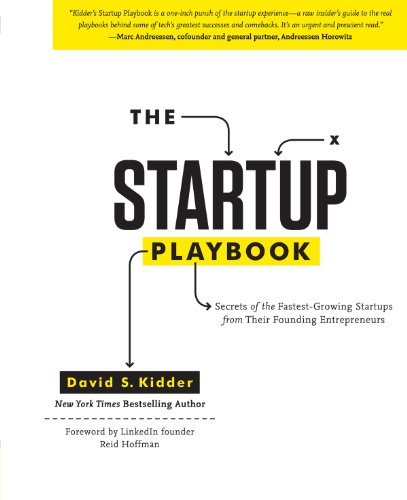Vision and Purpose
In "The Startup Playbook," David Kidder emphasizes the unparalleled importance of having a clear vision and purpose. This isn't just about having a lofty goal; it's about defining the very essence of your startup. Your vision is the guiding star that not only directs your journey but also inspires your team and stakeholders.
Kidder writes, “A compelling vision isn't just a statement on the wall; it’s the heartbeat of the startup.” This vision fuels your passion and keeps you motivated through the inevitable ups and downs of the entrepreneurial journey. It’s what differentiates successful startups from the ones that falter.
A well-articulated vision helps in making strategic decisions. When you're faced with tough choices, your vision serves as a compass, ensuring that every step you take aligns with your ultimate goal. It also plays a crucial role in attracting the right people to your team—those who share your passion and are committed to the same purpose.
Moreover, your vision should resonate deeply not only with your team but also with your customers. When customers understand and connect with your vision, they become more than just buyers; they become advocates for your brand. Kidder notes, “A startup’s vision should be so clear and compelling that it naturally attracts people who believe in it as much as the founders do.”
In essence, having a clear vision and purpose is about creating a narrative that everyone involved with your startup can believe in and rally around. It's about painting a future that’s so vivid and compelling that it drives everyone forward, no matter the challenges.
Resilience and Adaptability
In the fast-paced world of startups, one thing is certain: challenges and obstacles are inevitable. David Kidder's "The Startup Playbook" emphasizes the crucial qualities of resilience and adaptability, which are the true hallmarks of successful entrepreneurs. These traits aren't just desirable; they're essential.
Kidder highlights that the path to success is often fraught with unforeseen hurdles. However, the ability to bounce back from setbacks and adjust your strategies accordingly is what sets thriving startups apart from those that falter. He states, "Startups must embrace failure as a step toward innovation. It's not about avoiding mistakes, but about learning from them and pivoting quickly."
Resilience means having the grit to keep going when the going gets tough. It's about maintaining a positive outlook and a strong belief in your vision, even when faced with adversity. Kidder shares inspiring stories of entrepreneurs who faced numerous rejections and failures but persevered to achieve remarkable success. Their journeys illustrate that resilience is the fuel that keeps the entrepreneurial fire burning.
Adaptability, on the other hand, is the ability to pivot and evolve in response to changing circumstances. The startup landscape is dynamic, and what works today might not work tomorrow. Kidder advises, "Stay flexible and be prepared to change your course. The ability to adapt is what will keep your startup relevant and competitive."
The Startup Playbook is packed with examples of how adaptability can lead to breakthrough innovations. Whether it's tweaking a business model, rethinking a product, or exploring new markets, the ability to pivot effectively can turn potential failures into resounding successes.
In essence, Kidder's insights on resilience and adaptability provide a powerful reminder that the journey of entrepreneurship is not a straight line. It's a series of ups and downs, twists and turns. But with resilience and the willingness to adapt, any challenge can be transformed into an opportunity for growth and success.
Customer Focus
David Kidder emphasizes the undeniable power of putting customers at the heart of your startup. The essence of customer focus is about truly understanding and meeting the needs of your customers, a philosophy that can propel your startup to success.
Kidder highlights that successful startups are built on deep customer insights. He says, “The best entrepreneurs don’t just build products; they build solutions to real problems faced by real people.” This mindset transforms how you approach product development, marketing, and overall business strategy. It’s about listening to your customers, observing their behaviors, and empathizing with their pain points.
By prioritizing customer focus, you create products that resonate deeply with your audience. This connection fosters loyalty and turns customers into advocates for your brand. Kidder shares stories of entrepreneurs who took this to heart, such as how Airbnb’s founders personally photographed host properties to better understand and meet their users' needs. This hands-on approach not only improved their platform but also built trust within their community.
Additionally, Kidder advises startups to maintain an ongoing dialogue with their customers. “Your customers are your greatest source of learning,” he writes. Engage with them through surveys, feedback forms, and direct interactions. This continuous feedback loop helps you refine your offerings and stay ahead of the competition.
Customer focus isn't just about solving problems; it’s about creating delightful experiences that exceed expectations. When customers feel valued and heard, they are more likely to stick around and spread the word about your product. As Kidder succinctly puts it, “Happy customers are the best marketing strategy.”
Embracing customer focus can set your startup on a path to sustained growth and success. By consistently delivering value and maintaining a customer-centric approach, you build a solid foundation for your business. Kidder’s insights remind us that at the core of every successful startup is a deep, unwavering commitment to its customers.
Execution and Discipline
David Kidder, execution and discipline are the bedrock upon which successful startups are built. It's not enough to have a groundbreaking idea; the real magic happens in the meticulous execution and unwavering discipline that brings that idea to life.
Kidder emphasizes that executing your vision requires a laser-focused approach, where every action is aligned with your ultimate goal. He states, "Vision without execution is hallucination." This powerful quote underscores the necessity of transforming ideas into actionable steps.
Discipline plays a crucial role in maintaining this momentum. It’s about setting high standards and consistently meeting them. Kidder illustrates this with numerous examples of entrepreneurs who thrived because they adhered to strict operational disciplines. He shares the story of Airbnb, where the founders spent months living out of their own listings to perfect the user experience. Their disciplined approach to understanding every nuance of their service was key to their success.
Moreover, execution involves a deep commitment to continuous improvement. As Kidder puts it, "Success is not final; failure is not fatal: it is the courage to continue that counts." This quote highlights the relentless pursuit of excellence and the importance of learning from every experience, whether it’s a triumph or a setback.
Startups must also prioritize effective project management and operational efficiency. Kidder advises, "Focus on being productive instead of busy." This means cutting through the noise and zeroing in on tasks that drive real progress. It's about making the most of your resources and ensuring every effort is directed toward achieving your startup's goals.
Team and Culture
A great team isn't just about having the brightest minds; it's about creating a harmonious environment where collaboration and innovation thrive. Kidder highlights, "Your team is your most significant asset. Choose wisely, nurture consistently, and empower relentlessly."
One of the book's standout insights is the importance of shared values and mutual respect within the team. Kidder advises that aligning your team with the core values of the startup ensures everyone is rowing in the same direction. He states, "When your team shares the same values, magic happens. It's the glue that holds everything together, especially during tough times."
Fostering a positive organizational culture is equally crucial. Kidder describes culture as the invisible force that drives how things get done in your startup. It's about creating a work environment where team members feel valued, heard, and motivated to contribute their best. He says, "Culture is not just a buzzword; it's the secret sauce that differentiates thriving startups from those that struggle."
The book shares numerous anecdotes from successful entrepreneurs who attribute their success to a strong team and vibrant culture. For instance, Kidder points out, "A thriving culture isn't just about perks or parties. It's about trust, transparency, and giving your team the freedom to innovate."
Creating such an environment involves recognizing and celebrating achievements, providing opportunities for growth, and encouraging open communication. Kidder insists, "The best teams are those where every member feels they are part of something bigger than themselves."
Innovation and Continuous Learning
In "The Startup Playbook" by David Kidder, innovation and continuous learning are the lifeblood of any thriving startup. David Kidder passionately illustrates how the most successful entrepreneurs are those who never settle for the status quo. They are the pioneers, the relentless seekers of new possibilities, and the perpetual learners.
Kidder emphasizes that innovation isn’t just about having a groundbreaking idea; it's about the relentless pursuit of better solutions, products, and services. He states, “Innovation is not a one-time event but a habit that needs to be cultivated.” This mindset propels startups to constantly explore uncharted territories and refine their offerings to meet evolving market demands.
Continuous learning goes hand in hand with innovation. Kidder highlights that the best entrepreneurs are avid learners who thrive on feedback and view every experience as an opportunity to grow. He writes, “The path to success is paved with the bricks of failure, each one a lesson learned.” This approach turns challenges into stepping stones and fuels the innovative spirit within the startup ecosystem.
Moreover, Kidder shares inspiring stories of entrepreneurs who have embraced this ethos. For instance, he talks about the founders who continuously iterate their products based on customer feedback, demonstrating that listening and adapting are crucial components of innovation. He quotes, “Listening to your customers is the best way to stay ahead. Their feedback is the compass that guides your innovation journey.”
The book also delves into the importance of fostering a culture of learning within the startup. Kidder asserts, “Create an environment where learning is celebrated, and curiosity is encouraged.” This culture not only keeps the team motivated but also ensures that the startup remains agile and responsive to change.
In essence, "The Startup Playbook" portrays innovation and continuous learning as the engines that drive startups forward. David Kidder's insights remind us that success is not a destination but a journey of constant exploration, adaptation, and growth. So, embrace the spirit of innovation, keep learning, and let your startup soar to new heights!

